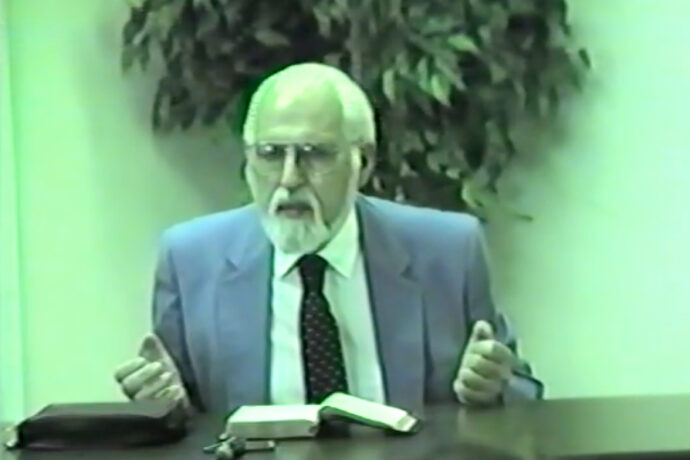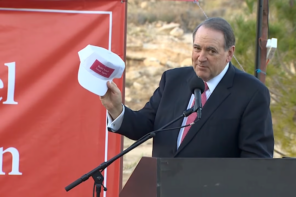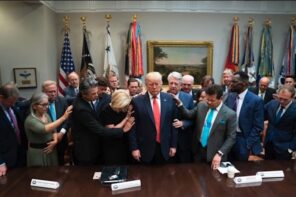Christian Reconstructionism is a twentieth-century theo-political movement whose influence—on the contemporary religious right, in particular—is little understood. Moreover, when Reconstructionism does come up in public conversation it is often in the context of some of its most extreme (and alarming) tenets: think biblical defense of slavery, the stoning of homosexuals.
Julie Ingersoll‘s new book, Building God’s Kingdom, is a meticulous account of this movement’s history and its aims. Founded by Rousas John Rushdoony in the early 1970s, Reconstructionism asserts the primacy of the Bible from the home to local government to national political life. While Rushdoony’s views were as alienating to the right as to the left in some aspects, many of his ideas did find traction among Christian conservatives.
I began my conversation with Ingersoll last week by asking her to elaborate on the history of that influence.
In what key ways did Christian Reconstruction contribute to the making of the contemporary religious right?
Reconstructionists had a lot to do with the widespread view among conservative Christians that every sphere of life—both public and private—is religious.

Building God’s Kingdom: Inside the World of Christian Reconstruction
Julie Ingersoll
Oxford University Press
(August, 2015)
Christian Reconstructionists argue that the Bible must govern every aspect of life. In their framework, known as “jurisdictional authority” or “sphere sovereignty,” God delegates biblical authority to three distinct, and severely limited, spheres of “government.” There is family government, ecclesiastical (church) government, and civil government, each with its own authority and sphere of legitimate influence.
So, for example, in this view, education is entirely within the purview of the family government, not civil government. Reconstructionists believe public education and even regulation of private education by the civil government violates biblical law.
Similarly, because Reconstructionists believe that economic activity is a function of the family’s call to dominion, economic regulation by the government is considered unbiblical—a fundamental tenet of what is known as biblical economics.
There’s a certain amount of dread associated with this movement and the range of its influence. As I mention above Christian Reconstruction is often associated with advocating slavery and stoning homosexuals to death. These views should provoke dread, of course, but does the focus on those two tenets lead to a misunderstanding of the movement—and provide an easy out for conservative Christians who want to disassociate themselves from it?
It really does. And I would add to that the focus on “dominionism.” People who know very little about Christian Reconstruction beyond these few points are often quick to dismiss it as a fringe element that is irrelevant. In doing so, I think they miss the real influence of the movement.
Reconstructionists do not seek to unite church and state but they do seek to bring the civil government under biblical authority. In fact, they seek the complete transformation of every aspect of culture to bring it into alignment with what they believe the Bible teaches.
For your book, you interviewed the late Howard Phillips, the former Reagan administration official, political operative, and later founder of what is now known as the Constitution Party. Phillips considered “Rush” (Christian Reconstruction’s founder, R.J. Rushdoony, who died in 2001) a close friend and mentor, and told you that “together we testified in cases of the ‘IRS assault’ on Christian schools.” This jumped out at me as part of the history behind current conservative fears that that the government will revoke the tax exemption of anti-gay schools and religious organizations. Can you talk about that history?
Reconstructionists see a fundamental and inevitable conflict between a “biblical worldview” and “secular humanism” and this animated the battles over tax exemptions in the 1980s, especially the revocation of Bob Jones University’s tax exemption over its ban on interracial dating. This wasn’t so much a defense of a ban on inter-racial dating (though of course it was that) but more a claim that the civil government had no authority to interfere in what the university claimed was a policy based in their religious beliefs.
As these battles continue today—especially in the fights over marriage equality—conservative Christian assertions of religious freedom appear to many people to be a claim that their religion should trump everyone’s else rights. A Reconstructionist would say that the very permissibility of same-sex marriage is a violation of the religious liberty of Christians who oppose it.
The roots of this lie in Rushdoony’s adaptation of the work of the Presbyterian theologian Cornelius Van Til, who developed an idea known as presuppositionalism. For Reconstructionists there are only two possible foundations for knowledge: the revealed word of God or the (false) claim of the autonomy of human rationality. Some of the leaders at the center of religious right efforts to “combat secular humanism” took the notion directly from Rushdoony, notably Tim LaHaye, an early political leader of the religious right and later co-author of the popular Left Behind series.
Out of presuppositionalism, then, arises Rushdoony’s view that a biblical worldview was fundamentally incompatible with any other—an idea that has manifested itself in education more than almost any other area.
This book is the product of more than 30 years of research—some of it your own first hand experiences. You married (and later divorced) a guy from a prominent Christian Reconstructionist family. And you were involved in anti-choice activism, even getting arrested at some Operation Rescue protests. Possibly more interesting than your own change of position on these issues is what your experiences showed you about the motivation and dedication of these sometimes violent activists?
I thought at the time that the motivations were more mixed than they seem to me to be now. It’s hard for me to see whether to attribute that to the limits of what I knew then, changes in me, changes in the larger culture, or a mixture of the three. I know it might seem like a contradiction to RD readers, but I was a feminist and pro-life before I “became a Christian” and I remained both throughout my years as part of this world.
Activism felt like, I imagined, antiwar protesters and civil rights protesters had felt a generation earlier.
This was before the rise of the movement we now call Quiverfull, which so much more clearly limits women’s roles to procreation in the promotion of patriarchy. It was also before the abortion-related violence that developed as I moved on. One person I had known quite well at one point was later convicted for arson of abortion clinics but when I knew him he was working in electoral politics and helping provide alternatives to abortion. He and I had lengthy discussions about biblical theology with regard to gender and women’s submission. We disagreed but they were real discussions.
Operation Rescue is an interesting case. “Rescuers” were required to participate in non-violence training sessions modeled on those used in the civil rights movement. But in the aftermath of the murders of abortion providers, Operation Rescue founder Randall Terry has often been ambiguous in his condemnation of the violence.
Now it is clearer to me how his rhetoric lent itself to the justification of violence. He would say: “If you really believe abortion is murder why are you only writing letters to the editor about it? You should join Operation Rescue.” But it’s only a small step from there to: if you really believe abortion is murder what are you doing sitting around blocking clinic doors?
It might surprise some readers to find out that Christian Reconstructionists consider the contemporary religious right to be, as you write, “philosophically schizophrenic, so its efforts to return America to its Christian moorings are doomed.” Yet some Christian Reconstructionists played a key role in providing ideological underpinnings for the religious right. Where do they think it has gone wrong?
I once emailed Gary North (Rushdoony’s son-in-law and a leading proponent of “biblical economics”) about this book, describing it as a work on the legacy of Rushdoony in the religious right. He replied with just two words: “short book.”
Reonstructionists think contemporary American Christians need to be more self-conscious about bringing every aspect of their lives under biblical law.
Reconstructionists do engage in explicitly political work but they claim that what they see as the religious right’s over-emphasis on the role of civil government is itself humanistic and therefore doomed to fail.
What Reconstructionists envision is a multi-generational transformation that starts in families: families need to be reconstructed in terms of biblical patriarchy. Women need to be in submission to men; children need to be educated in the home to fulfil their specific roles in terms of the exercise of dominion. Churches should be comprised of godly patriarchal families in submission to church authority.
I spent a lot of time thinking through how it is that Reconstructionists claim the religious right has failed while I maintain that the Reconstructionists have had more influence than has been recognized. It seems to me that our standards vary. Reconstructionists are looking for thoroughgoing consistent application of biblical law to Christian life and they do not see that happening.
At the same time, I see a piecemeal embracing of frameworks, language and strategies. It’s probably too complex to condense here but there is a more detailed presentation in the book.
While Christian Reconstruction and the religious right have largely disassociated themselves from one another—the Christian Reconstructionists saying the religious right sold out, and the religious right wanting to appear more mainstream—the homeschooling movement has been an important and celebrated part of the religious right. What was Reconstruction’s, and Rushdoony’s in particular, role in boosting the fortunes of the homeschooling movement?
Whenever I write about homeschooling and Christian Reconstruction there is a chorus of homeschoolers who want to distance themselves and point out that not all homeschoolers are Reconstructionists. That is certainly true. However, Christian Reconstructionists have been crucial to the character of the home schooling movement.
The Reconstructionist role began with Rushdoony’s early work in securing a legal right for parents to choose how to educate their children as a matter of religious freedom—that has become relative autonomy for home schooling parents in most states. Christian Reconstructionists have helped shape much of the available curriculum (including the almost universal emphasis on young-earth creationism), and exerted important influence over what gets promoted in the network of home school associations and conventions.
For Reconstructionists, public education is inherently unbiblical. This is in part because of the secularity of public schools, which is seen as a rival religion, an example of the elevation of human reason as the ultimate authority. But even if that could be effectively addressed, education is a family responsibility for which the civil government has no authority.
Reconstructionists want to “reconstruct” every aspect of culture according to biblical law. There are lots of ways they seek to do this but their most important strategy is to undermine public education to the point where they can completely replace it with Christian schools and homeschooling.
Okay, now for the lightning round. What did Christian Reconstructionists, who were writing extensively in the 1960s and 70s, say about the civil rights movement?
It was a communist plot. No. Seriously. Many of the early Reconstructionists had ties to the John Birch Society and, as a solidly middle-class white movement they maintained the fiction that most African-Americans were happy until tensions were “stirred up” by agitators.
Are Christian Reconstructionists neo-confederates?
I’ve tried to handle this delicately and in detail in the book and a brief answer is really difficult. This is partly because neither of these movements has clear-cut membership requirements and it depends what you mean by neo-Confederates. There are numerous organizations that identify as Reconstructionist and Neo-Confederate that hold lectures and conferences—there is a lot of cross-fertilization among them. There are certainly people who identify with both groups. Kinists, for example, find in Rushdoony’s work biblical sanction for white supremacy. There are also points at which Reconstructionists have tried to distance themselves from neo-confederates and white supremacists: Mark Rushdoony, who now heads his father’s Chalcedon Foundation has explicitly rejected Kinism.
What’s important, I think, is the larger way in which Rushdoony and the Reconstructionists helped build a resurgence of interest in and affection for, a pre-civil war vision of society. They did this, in part by promoting the work of Southern Presbyterian theologian R. L. Dabney and the view that the civil war was not about slavery but was a religious war to preserve a godly southern culture from the tyranny of a secularizing North.
What do Christian Reconstructionists believe about the Second Coming?
Unlike the majority of conservative Christians who are premillennialist (they believe that Jesus’ return will precede the establishment of the Kingdom of God), Reconstructionists are postmillennialist. They believe that Jesus will return at the culmination of the establishment of the Kingdom of God that was initiated at the resurrection. They believe this will happen through Christians preaching the gospel and exercising dominion. This was the dominant evangelical view in the 19th century America, although that changed in the late 19th and early 20th century.
What does Roy Moore, and the religious right’s admiration for his antics, tell us about the ongoing influence of Christian Reconstructionist ideas?
Well, I know you’ve written quite a bit about Judge Moore and, as an example, he’s a perfect illustration of the ongoing influence. He is something of a folk hero for conservative Christians but you rarely see recognition of the background to his views.
Moore is a regular speaker at explicitly Christian Reconstructionist conferences. His reasoning often invokes the notion of sphere sovereignty. What’s more, he invokes an even more fundamental aspect of Christian Reconstruction: the view that there are ultimately only two sources of authority and all knowledge is dependent on the acceptance of one or the other with neutrality between the two being impossible. They call this presuppositionalism and it is what Moore is talking about when he invokes biblical authority over “humanism.”





